COVER STORY
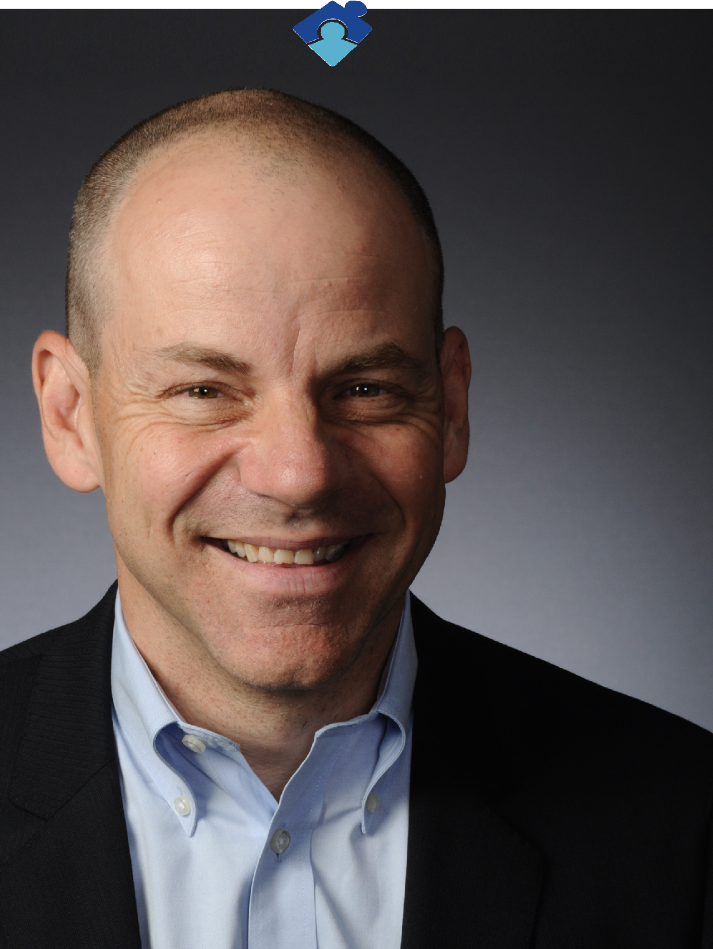
I'm one of those spectrum people who often laughs when others think I should be crying, and crying when others think I should be laughing.
I could make people laugh – I know that now.
But not when I was trying to.
AUTISM AS COMEDY
BY MICHAEL JOHN CARLEY
They say it takes twenty years.
According to the drama school I attended, you can't tell a joke about an event wherein many people suffered until sufficient time has passed. More than one professor in our glamorous graduate program relayed their estimate of how many years you had to wait. Unanimously, in their efforts to quantify human struggle, they all said twenty.
Obviously, some events take longer, or shorter to process. The (real) pain of a favorite sports team's playoff loss can often be joked about the next day. And not unexpectedly, it took us over half a century before we could enjoy – if not endure – Life is Beautiful, Roberto Benigni's comedy about the Holocaust. In arguably humanity's greatest injustice on itself, the Holocaust needed twenty years just to be dramatized.1
Because the secret ingredient of all comedy is tragedy, we need the time to mourn, forgive, and move on before we can make light of the negative experience. Yet sometimes becoming over-frustrated by our suffering is what's required for closure, not closure itself. In order for us to move on from a fear, we often need only to become sick and tired of being afraid.
One ground rule/disclaimer:
I can't entertain this topic without risk. Anytime we approach the fine line between humor that can be ambiguously interpreted as respectful, or disrespectful, our conversation threatens to validate the bigots who want to tell hurtful jokes. Such denigrators of progressive politics look for any window to return to the days in which they could poke fun at tragic events, or marginalized communities whenever they felt like it. As a "poker tell," these like it. As a "poker tell," these unhealthy folk reveal themselves by enunciating the acronym, "PC," with more than noticeable resentment. Theirs is a bitter desire to criticize victims, minorities…that does not come from a sense of humor. It originates instead from a deeply insecure part of themselves.
When used properly, humor is growth. True comedy cannot happen unless we are pulled out of our suffering, and can see how the bigger picture resonates – outside and not within the pain. Somehow, we finally see that laughing would feel really good, and everything after that revelatory moment feels different. In physics and metaphor, distance always makes objects appear smaller, and this is simply how humans often heal. In my sex talks, I like to say "no one feels low self-esteem when they're having an orgasm." Well, the same could be said about laughing.
And it has been almost twenty years since my older son and I were diagnosed a week apart as being on the spectrum. At the time I was a minor-league diplomat working for a veterans organization.2 And my current endeavor as Veterans for Peace, Inc.'s (VFP) United Nations (UN) NGO Representative involved serving as the Project Director for their "Iraq Water Project (IWP)." Before the 2003 invasion, our sanctions on Saddam Hussein's government were causing the deaths of over 5,000 children under the age of 5 per month, mostly due to waterborne illnesses that were caused by the sanctions. This figure was no exaggeration: it came from UNICEF,3 which, as an agency of the sanctions-implementing UN, figuratively amounted to a signed murder confession. When confronted on 60 Minutes with 500,000 dead Iraqi children, thenSecretary of State, Madeline Albright, did not deny the number, she defended it. "We think the price was worth it."4
In my trips to this part of the world, I knew those hospital wards, both in Baghdad and Basrah. And in March of 2001 I was in charge of a delegation of VFP members (from WW II, Vietnam, Gulf war…) that toured more than one room full of those dying kids. And there was a particularly bitter, painful scenario that occurred more than once…
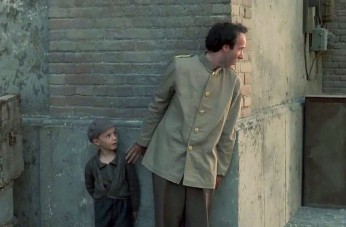
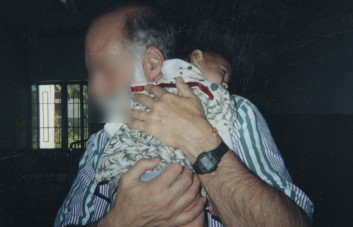
TURNING A CORNER: (Above left) It took us over half a century before we could enjoy — if not endure — Life is Beautiful, Roberto Benigni's comedy about the Holocaust. (Above right) In the hospital wards of war-torn Baghdad and Basrah, vets holding the emaciated bodies of children would often have "a moment" that had been building inside them for some time.
The vets would ask to hold the emaciated bodies of the 0-8 year olds. The traumatized, bedside mothers would numbingly comply. They were used to such visitors, as the Iraqis encouraged foreign delegations to witness these wards and thereafter circulate the images they took. My vets would hold the children… and then once or twice the vets started to cry, and get very upset. The mothers then changed their minds about it being ok that these well-meaning but strange people were holding their children. Whether they were afraid that the vets would become so distraught that they might drop their diminutive toddlers, or offended by the vets' display, the mothers were done with us.
But the vets didn't seem to notice the mothers' pleas to give them back their children, deaf to all but the beauty and redemption they felt in their own tears… having "a moment" that had been building inside them for some time.
I am still very close to some of those vets, and at the time we all had to be very close. But can't their desire for a tearful encounter be seen as containing assumed privilege? That maybe this inability to hear the mothers even had a colonialist ingredient – however humanist – of entitlement? And if so, isn't that more funny than hypocritical? Because they were nothing other than caring, wonderful people who had travelled at their own expense to help these kids. It's not funny to me because I had to be the one to intercede; but if others – average folks – saw this scene on a screen, and Will Farrell was playing one of the vets?...
Back in New York City, trying as would any parent or individual to learn about these crazy new words like "autism" and "Asperger's," I sat in a parent group and watched a dad cry as he told the story of how his spectrum son flapped his arms and made noises in the supermarket. His tears flowed hardest when, after relaying the dirty looks he got from fellow shoppers, he wondered aloud what he had "done to deserve this."
Spectrum or not, I was a diplomat at the time. And thank God for that training as the dad never knew my reaction. He never found out that, after all that time with dying Iraqi children, I wanted to yell at him, "Your child is alive. Shut up! And love it."
This autism dad's out of sight sense of entitlement, and questionable priorities, comedically placed in the same room as my righteous indignation; one born of cultural opportunities that so few are privileged to enjoy. Seriously? I couldn't forgive him for not having the cultural opportunities I'd been so lucky to have? It's not a sin to not have had those cultural opportunities. So what was the matter with me? I knew once I'd calmed down that what had happened was pure Vonnegut: Two forces unable to see past their own experience. I'll cite a perfect example of this "competition of suffering" phenomenon, one that I wrote about in a 2006 article for Autism Spectrum Quarterly5…
As best as I can remember, the episode of HBO's Curb Your Enthusiasm went like this: The main character, Larry David, meets a friend on the street. "Are you coming to my dinner party?"
he asks. The friend replies, "I can't. We have someone staying with us who's a survivor. I just think he'd feel out of place." "Don't worry about it," David reassures him. "I also know a survivor. I'll get him to come, and we'll seat the two of them next to each other." Comes the dinner party.
In one seat sits an 80-something veteran of the Dachau concentration camps – his tattoo still prevalent. Sitting next to him is a 20-something male who had been a contestant on the CBS series Survivor. The next camera shot has the two men standing at the table arguing. "We were gassed!" screams one. "I had to eat bugs, man!" screams the other.
And based on this unique (judgmental) background for someone diagnosed then with Asperger's, and now (after a post-DSM-5, re-look under the hood) with autism spectrum disorder, was I really a personality that was well-conditioned to work in this field? Because the tradeoff for my educated ability to spot over-privilege was the dirty, dark secret that I would have to carry and never share…that the autism world was a gold mine for comedy writers.
We dealt with bigotry, stigma, our humanity invalidated not by outsiders but by a majority of insiders, by the largest "autism organization;" by bullying, depression, abuse, anger, neglect… Would all of the tearful, passionate, selfless work that we were engaged in, someday be laughed at? Yes!
For starters, the autism spectrum is indeed a very vast spectrum. On one end you might have Albert Einstein, Emily Dickinson, Beethoven, Thomas Jefferson, Alan Turing…and on the other end of the spectrum, you've got someone who might never acquire speech, a steady job, or an intimate reciprocal relationship. Unlike cystic fibrosis, or Down syndrome, there is no one mental picture of what this looks like that will work. Now THAT'S a spectrum – and it's one that no other condition can claim.
So how then to sell awareness to the average Joe or Jane in the street? As human beings we desire to compartmentalize, and categorize. We are looking for simple ideas to grasp onto, not complexities. Do we just sloganize with "Autism: You can't dumb it down"? This potentially giant discrepancy amongst what makes spectrumfolk spectrumfolk has taken us through years of that farcical "competition of suffering," territory surrounding our identity that literally encouraged both ends of the spectrum to go after one another.
Autism Joke #1
Parents of significantly challenged spectrumites once saw speech as the measuring stick of happiness, decrying that spectrum people with IQs in the 140s were so much luckier. Monster organizations like Autism Speaks sowed resentment in their members, literally telling them to embrace a tragic interpretation of autism, and (along with the anti-vaccine crowd) encouraging them to look for something or someone to blame for autism's place in their lives.6-20 To them, coming to terms and making peace with autism …that was for the idiots who "didn't understand." If you were angry, then Autism Speaks wanted the microphone in front of you, not the parent who'd made peace with the world. What is the sickest part of what they did is not how they insinuated that our lives were without value. It was how they betrayed their own, overwhelmed constituents; people that looked to them for leadership, and healing, yet were instead told to get even angrier.
And yet parents of folks like me saw speech the same way, and insinuated privately that the parents of significantly-challenged kids were coming up short… as parents. When our sides' "geniuses" or "savants" went out into the world with the expectation of becoming CEOs, no one explained to them how the social world works, and they instead became intensely lonely, fell apart, and often became suicide statistics. Given how significantly-challenged folks often have decent, clean places to live, have an ok diet, know when and where it's ok to masturbate… you could argue herein that the most non-verbal of them can at least be happier than the aforementioned guy with the giant IQ. Speech as a measuring stick for happiness… is a joke, as is trying to paint one end of the spectrum as being better or worse off than the other.
Autism Joke #2
The whole "parent thing" had hit a sensitive (and comedic) nerve, because the history of autism is rooted in stigma that was once entirely resolved by blaming the mother. Back in the 1960s, when Bruno Bettelheim was our clinical rock-star genius on all things autism, he put forth that autism originated because in the nanoseconds immediately following the spectrumite's birth, that the mother hadn't been affectionate enough.
Now, these poor women of course thought back and realized "No way! I KNOW I was affectionate with him right after." Yeah, but… you were just a dumb mom back then, and Bruno Bettelheim's every word was bought hook, line, and sinker by the American public. So eventually, in order to fit in, you'd have to concede that you must have been mistaken. After all, your partner probably doesn't believe you. He or she may love you, and feel for your pain as you come to terms with your responsibility for your child's autism, but no. He/she believes what the rest of the world believes.
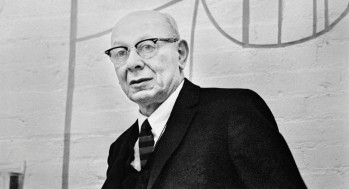
DR. NO: Bruno Bettelheim argued that autism originated because the mother hadn't been affectionate enough in the nanoseconds immediately following the birth of her child, resulting in negative stigma to the word autism and destroying thousands of families.
And what about the siblings? As this was the "put him in a home and forget you ever had him"-era, the siblings might have complained to their friends, "Don't expect any affection from mom. Want to know what she did to my brother?" If you were ever wondering where the phrase "refrigerator mother" comes from,21 now you know.
In addition to attaching negative stigma to the word "autism," Bruno Bettelheim destroyed thousands of families. Also, the individuals placed in those homes, if born today, would have had infinitely better outcomes. And they are not dead yet. Elderly, and irreversibly damaged by decades of neglect and overmedication, many still languish in institutions. Won't we someday find incredulous humor that all this nonsense was believed… in the most privileged country on earth?22 And to perfectly conclude this portion, is it not ironically flawless that after his death, we found out that Bruno Bettelheim had faked all his doctoral credentials?
Autism Joke #3
And then there were the vaccine theorists, who thought us all to be chemical accidents. (To keep things moving, I'm picking just ONE of many examples of how moronic this movement was.)
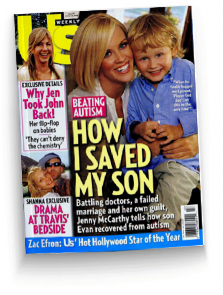
DANGEROUS VOICES: Jenny McCarthy has promoted the idea that vaccines may be linked to increased incidence of autism, an argument that is scientifically unsubstantiated.
Now, I'm an occasional sex writer, so I truly mean NO disregard for ex-Playboy bunnies; but when your movement stating that autism comes from vaccines is not led by a scientist – a reputable figure in the field that can give your cause the stamp of authenticity – and is instead led by Jenny McCarthy,23 whose only claim to fame is… ? (you guessed it, Playboy)… How is this not ridiculously funny?
Autism Joke #4
Around the late 2000s we all caught wind that once again, the world's great clinical brains would get together and create a new Diagnostic and Statistical Manual (DSM). The fifth edition, "DSM-5," was to come out in 2013.
Unfortunately, in addition to widely-controversial criteria changes,24 the actual committee had a very public breakup. In 2011, Yale's Fred Volkmar broke from the group,25 and whistleblew that the clinical trials were not conducted appropriately, that the committee wasn't even meeting as much as they were supposed to, and that the committee was lying to the public (and he was right) about whether or not the new criteria would deny services to those who had enjoyed them prior through DSM-IV.
Involved in this ugly fight from an advocacy standpoint, I'll never forget the call I had with the committee… Disagreements over the proposed changes took a far second place in my memory to the entitled, spoiled bitterness the committee exhibited in my audience with them. They were so angry not so much with the disagreements, but that people had dared to challenge them.26 What resonated was that Volkmar and a more educated public had ruined their once-in-a-lifetime chance at changing the way people interpret how emotions and the brain work, and they were angry about it. Being a DSM author was the ultimate impact their field allowed, and we had more than tarnished their contributions, we (well, really, they) destroyed their reputations.
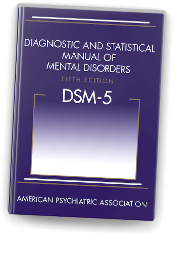
LOST OPPORTUNITY: The DSM committee had blown their once-in-a-lifetime chance at changing the way people interpret how emotions and the brain work, and they were angry about it.
As a result of the public feud, the world lost a tremendous amount of trust in the clinical community, not just in the new edition f the DSM. Diagnostic anarchy has somewhat been the norm ever since. Granted, clinical professionals have always been easy targets of satirists, but… how is that not beyond funny?
Autism Joke #5
We as individuals are not exempt from the humor of insecurity, and one might argue that our challenges towards emotional regulation make us comedy factories. As the head of the world's largest membership organization for adults on the spectrum (GRASP), I quickly saw that, because of the giant variety in functionality, the idea that we had, or would create a true "autism community" was (forgive me) a laughingstock.
Significantly-challenged individuals often saw the spectrum lawyer with the high IQ, not as a brother, but as a massive threat. They'd figuratively point at the lawyer and scream "That's not me! You don't get to lump me alongside him because then I'll look a failure by comparison!" Yet the aspie lawyer did the same thing, pointing at his challenged "cousin," and exclaiming, "That's not me! You don't get to lump me alongside him because then people who know what I have will think I'm limited!"

AT ODDS: Because of the giant variety in functionality, the idea that spectrumfolk could create a true "autism community" is inconcievable.
Militant spectrumfolk spent more time going after moderate spectrumfolk than they spent going after organizations like Autism Speaks. Spectrumfolk with incredibly low self-esteem signed on to work with, and stand with Autism Speaks. I privately barfed whenever I heard the words "autism" and "community" lumped together.
Some readers may have thought of the conundrum facing this article. It's written by a person on the spectrum. And as people on the spectrum, our senses of humor, or our ability to guess what others might find funny, are often underdeveloped. Obviously my theatre training gave me slightly better radar. But back in those playwriting days I had to endure a tough lesson about how unable I was to detect humor… I had written a play about a woman (I knew) who worked in an S&M (sexual sado-masochism) dungeon. In The Dungeon Opera's construction, it was probably the shoddiest play I ever wrote. But because it was such a great role for actresses to sink their teeth into (and in addition to few great roles for women, BDSM was a very new topic in 1986) it was the most produced of all my work. I thought I'd spilled figurative blood on every page, having often written it in tears. But in its first and subsequent productions, the audience was laughing… at everything. I was so offended that first night that I wanted to interrupt the play, jump on stage, and scream at the audience. My friends Oliver and Scott, as I recall, talked me out of it. "But that's not funny!" I whisper-screamed inside the lighting booth, in protest. But I was wrong. It was.
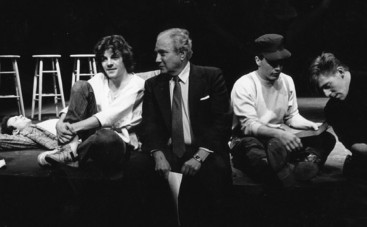
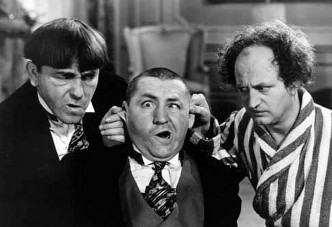
TURNING A CORNER: (Above left) The author (far left), age 22, at a rehearsal for Amerikansche Lehrstuck in New York City in 1987. In the first and subsequent productions of his play The Dungeon Opera, the audience was laughing… at everything. (Above right) The Three Stooges used improbability and the art of slapstick in their physical brand of humor.
I'm one of those spectrum people who often laughs when others think I should be crying, and crying when others think I should be laughing. I could make people laugh – I know that now. But not when I was trying to. I don't get or appreciate many different types of humor. Part of a child's development often involves their trial and error relationship with telling jokes, and as a pretty decent father elsewise, I really come up short herein with both of my boys. "Guys, I couldn't tell you if it's a good or a bad pun. I just really suck at jokes, sorry" (for this, they go to Kathryn).
I can elicit laughter in others. But to my horror, I had to learn that this ability came only from a dark, and not humorous place. The best example I remember that defined this sense was when I left my hotel room in Las Vegas one day, and got on an elevator to go down to the lobby and head out for dinner. Three people were already on the elevator, and they instantly resonated with the bitterness that only heavy gambling losses can create. After I pushed the button, an automated voice spoke: "Going down." I couldn't stop laughing and was soundly hated by my carmates until we got to the lobby. That all said, there are different types of humor. And autism often presents different levels of interpretive ability for each.
Humor and Interpretive Ability
FARCE, SLAPSTICK, PHYSICAL HUMOR: This usually involves a high degree of improbability, such as when the Three Stooges would poke each other hard in the eye. Yet seconds thereafter they were fine.
Very often too, it's the engine behind the older cartoons, like Bugs Bunny, Tom & Jerry, or Woody Woodpecker, as with animation you're not restricted to real time, and no one second-guesses you when after being blown up by dynamite, you're alive and well in the next frame.
But especially in this age of political division I've been drawn back to the lessons I learned about the slapstick art of clowning, for the humor that clowns employ is usually based on the idea that they never learn from their mistakes. They repeat them. This is humor that children easily recognize and so this is why children have historically been drawn to clowns.
SELF-DEPRECATING HUMOR: Herein I think of Amy Schumer or Dave Chappelle, who take ownership over characters drawn from biased and unbiased perceptions of themselves – thus almost taking the message out of the realm of self-deprecation. While they work off different cultural stereotypes, both Schumer and Chappelle brilliantly illustrate societal-induced deficiencies in self-esteem. And they teach, across cultural divides.
IMPERSONATION: As it sounds. This comedic form involves the imitation of national, regional, ethnic, or class accents – but without the heavy messaging that satire (which almost always utilizes impersonation) contains. It is a form that society has somewhat turned against, given how belittling the portrayals of others often were, and how empty the form felt without the validating layer of satire's political intent. When permissible, however, Jonathan Winters was the king of this form. And it was Winters who inspired the career of Robin Williams. RAGE HUMOR: (Admittedly, this is my own categorization.)
RAGE HUMOR: (Admittedly, this is my own categorization.) Herein I'm thinking of so many comics who begin their joke with the words, "You know what I hate?" And I'm not even sure this is comedy.
ABSTRACT, BIZARRE HUMOR: This is usually defined in two ways. One, by the short duration it takes to tell the joke, and two, the unexpected punch line. Steven Wright was probably the king of this style. To quote two examples of his work: "I had a dog once. I named him 'Stay.' I'd say 'Come here, Stay. Come here, Stay.' And he'd get all confused. But now he's smarter. Now he just ignores me, and keeps on typing." Or…
"I got thrown out of the movie theatre for bringing my own food. My argument was that the concession prices were outrageous! (Beat) Besides, I've haven't had a barbeque in a long while." WORDPLAY: This is a form based only on words having sounds
WORDPLAY: This is a form based only on words having sounds that are similar to other words. "Why did the scarecrow keep getting promoted? Because he was out standing in his field." 27 Or… "Did you hear about the chef that died? He pasta way We cannoli do so much He became a pizza history He ran out of thyme." I've never been a big fan of this form. It's just too easy to construct. Where's the skill? Yet for those of us with greater challenges, it's a great introduction to humor.
SATIRE: Here we come to what I believe is the spectrum world's greatest chance for shared laughter with the rest of the world, for satire is defined as our ability to both find humor at ourselves as a culture, or to make fun of greater society. This becomes especially attractive to spectrumfolk as satire is at first a deconstructive critique, followed by mimicry that contains a negative judgmental value of the culture. It's very much an outlet for healthy revenge fantasies; getting back at that majority populace and/or dominant culture that may have (intentionally or unintentionally) given us a very hard time.
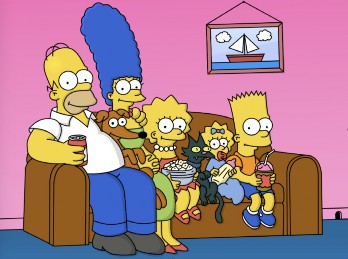
NUCLEAR FAMILY: The Simpsons exemplifies the quantum leap in America's comfort with self-incrimination, mostly through animation. Kids today have lots of options for getting some imaginary, vicarious payback on a cruel world.
When I was growing up, Americans wanted no part of satire. We really had major issues with laughing at ourselves as a whole, and so satire addicts like me had to turn to the British, who excelled at satire. I was that obnoxious kid who by age 10 not only knew all of the Monty Python's Flying Circus skits, and who could perform every one of their accents, but I also recited them in not-so receptive environments whenever I felt like it (my poor mother…).
But since then, Americans have made a quantum leap in the comfort towards self-incrimination, mostly through animation.
Starting with The Simpsons, we quickly expanded with South Park, Family Guy, and American Dad. The kids today have lots of options for getting some imaginary, vicarious payback on a cruel world. Over the last ten years, we've even seen some spectrumfolk try their hands at comedy – no, not just being more receptive to more forms in our appreciation, but as actual comedians.28 I have felt terrible in my inability to sincerely promote them because I just don't think they're funny. That may be my inability to appreciate their ability much more so than any lack ability on their part; but it still sucks (for me, if not them as well).
Our capacity, and our warehouse for humor is there – our mishaps in dating and employment gaffes are textbook farce – but the capacity contains two levels of duplicity that often fools, and/or can be alien to others. And this is notion is much more embodied in significantly-challenged spectrumites rather than those that look more like me.
Like passion, the two levels of humor where we can be misleading have to do with A) what triggers our sense of humor/passion, and B) how it is displayed. (A) We may find different things to be funny. And (B) we may not display passion in the same way that Luciano Pavarotti sings an aria, or the way Alex Ovechkin goes after a loose puck. The same goes for humor. We may stim (with our teeth, our hands, vocal chords) as a way to display laughter, and yet have it misinterpreted as displeasure or anxiety by the surrounding neurotypicals.
Further complicating things is where sensory integration issues – a common staple of spectrum life – can play a role, however bizarre. When I was younger there were certain sounds that just left me laughing uncontrollably until it hurt. A herd of sheep "baa-ing" was a big one. Another was the sound of the French language being used in either rap or rock music (this cost me a French girlfriend in college). Though I'll leave it to better brains than mine to figure this out, but I strongly feel certain sounds once had a tickling effect on my body.
From a very early age I had noticed a dichotomy between the two families from whence I came. On one side was, urban, protestant, middle class university folks who were financially stable. On the other, rural, catholic folks who'd endured financial hardship, and more of their share of personal tragedy. Both sides emanated love, but the rural group made fun of themselves. Their misfortunes had not been "lessonless," and so long as they never took the self-criticisms to levels of self-condemnation, they derived visible healing when able to poke fun at… really, misery itself.
Yet I still couldn't construct humor out of tragedy, and I wanted that power. My LGBTQ friends in high school were funnier than me not just because of my undiagnosed autism condition. They were more free. Despite the still-violent bigotry towards them in the 1980s, they saw that laughter (and intelligence) was a weapon. So they used it.
In college I began to understand the machinations of humor on our emotional well-being through literature. And back then at Hampshire College, no matter your social ability, if you could quote from Milan Kundera's Book of Laughter and Forgetting you would not go celibate. But as my grad school Dungeon Opera story attests, I still couldn't conjure this understanding in myself.
So I gravitated towards a field – international relief and political advocacy – where there were few laughs. Too many lives were at stake. And I felt at home.
And then after my diagnosis, I switched careers and entered a field, the autism field, that was as challenged at the healing power of laughter as any other – not just because of how humor often needs nonverbal communication, euphemisms, sarcasm…but also because we are challenged most by one component of Executive Functioning that I believe is always underestimated by educators and clinicians, and that is so often denied by the individuals – the people like me – even when it's right in front of our face, because it so hurts our efforts at obtaining normal levels of selfesteem. Our challenges at Emotional Regulation (one of many components of Executive Functioning) are the cause of 90% of the unhappiness experienced by adults on the autism spectrum. The angst or anger that would be inherent in any discomfort, perceived insult, sensory challenge, or inaccurate interpretation is driven to abnormally high levels by Emotional Regulation. Emotional Regulation is no joke, and it wants you to know that it does not tolerate jokes that might attempt to invalidate its power.
Because of Emotional Regulation, will we in the autism world have to wait longer than the fifty years it took to find humor in the Holocaust?
Probably the only smart thing ever to exit my mouth was used in an article I co-wrote with the great Barry Prizant (author of Uniquely Human)29 where I said that the opposite of anxiety wasn't "calm." The opposite of anxiety couldn't be "calm" because "calm" is like the number 0. It's an absence, and can have no opposite. The opposite of anxiety is trust.
I trust Kathryn, my wife. We laugh together a lot, and we use all the forms of humor that I listed previously – even the cheapest one, rage humor, as too often when we see each other after work, we become doubled over by how alien someone else's behavior made us feel that day. It helps to take a cheap and fun shot at them behind their backs, and behind closed doors.
I also sometimes conjure those old abilities at accents, at creating characters, and we have a few that we've developed over the years that have become constants in our lives, roles we have shaped, and that we summon without warning… in order to have fun. These characters, however, often push boundaries, and dare to cross into territory that would bestow us with criticisms were we to conjure this humor outside our home.
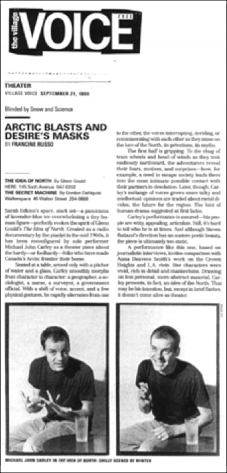
IN CHARACTER: A 1999 Village Voice review highlights a one-man play performed by the author.
One character is called "the abusive British boyfriend." Now, the abusive British boyfriend does not emerge in physical situations (thank God), but like the other characters we live with, he makes statements and commentary in an abrupt and unexpected fashion. The dialogue emerges because of both a desire on our part to temporarily abandon responsibility, but also because I feel we've discovered some insight into how real "abusive British boyfriends," and the partners that inexplicably stay with them, think. Without intelligence, the comments would be anything BUT funny. But Kathryn almost always chuckles, and sometimes the very abrupt nature of the comment – coupled with it making some satirical sense – renders her doubled over in laughter, which makes me pleased, and so I (resuming my normal persona) laugh too. These characters give us reassuring insight into the humanity of people we don't like.
But to be clear, this reflects the same inability as I showed during the Dungeon Opera. My comments in the guise of these questionable characters are derived from observations of pain – mine or someone else's. They're not funny to me. Thankfully, after three decades of coming to terms, I can be happy – truly grateful even – that my observations are funny to others.
Furthermore, I know I can find humor in the mishaps of Emotional Regulation. I just hopefully know when and where it's ok to admit that.
Autism Joke #6
My policy with my older, fellow-spectrumite son was pretty simple: Journalists could not take his picture, use his real first name, or mention what school he attended (there'd been tons of negative email, and even a death threat from the antivaxxers). But outside of that, if "C.C." (his chosen pseudonym, after the baseball pitcher) wanted to talk to a journalist, that was up to him. And he fluctuated. In growing up he went back and forth through periods of comfort and discomfort surrounding his father's line of work. At a younger age he wondered why he couldn't "come on TV" with me. And during his early teen years he wanted nothing to do with my work, asking that I never mention it amongst his friends (I coached some of his travel baseball teams, so my accidently talking about work in front of his peers was a danger). While I respected his wishes, something in me was sad that he was suffering from a stigma that I had spent my life trying to obliterate.
When the DSM-5's proposed changes to the diagnostic criteria were leaked, and the word "Asperger's" was perhaps going to go away with its inhabitants transferred under the umbrella of "autism"… requests for interviews were numerous. C.C. twice okayed joining me for interviews. In the first, with BBC Radio, he and I went on record as disagreeing about how we felt about the DSM-5's changes. And in the second, for a book on the history of the DSM,30 the writer wrote something along the lines of "It was like watching Gloria Steinham interacting with a daughter who just wanted to listen to Britney Spears." (That is pretty funny…)
And in listening to C.C. it became clear that what I saw as identity, he saw as pathology. He was of a different generation. Years had passed. Society was different. He was right. I was wrong – Not about myself, but about him. For in all these years, we had changed things. These words – "Asperger's," "autism" – don't mean the death sentence they used to. His playground atmosphere was different than mine. He wasn't trying to pretend he was something he was not. He just didn't need the elevated importance of his diagnosis with his interactions because he lived in a new and different world, one more behaviorally permissive, and that his idiot father helped shape.
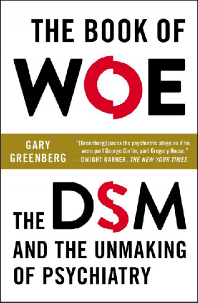
OOPS... I DID IT AGAIN: C.C. lives in a new and different world, one more behaviorally permissive that his idiot father helped shape.
The ultimate goal of any non-profit is not to become a multibillion dollar organization. The ultimate goal has to be its own abolition. Because non-profits do the work that theoretically, governments are supposed to do in caring for their marginalized people – yet don't… the ultimate goal has to be the day in which we're not needed anymore. Twenty years ago, we had been so sick. I hadn't seen until then that we were so much better.
I won't be the lucky one who writes the great comedic masterpiece about how gut-wrenchingly funny this will all one day seem. I'm still too invested, I'm not that good a writer, and I am still not funny. But the biblical, human relief we'll all feel when we can laugh about it? I will be honored – No! I will be blessed to be a part of this joke.•
ABOUT THE AUTHOR:
Michael John Carley is the Founder of GRASP, a school consultant, and the author of Asperger's From the Inside-Out, (Penguin/Perigee 2008), Unemployed on the Autism Spectrum, (Jessica Kingsley Publishers 2016), the upcoming Book of Happy, Positive, and Confident Sex for Adults on the Autism Spectrum… and Beyond!, and the column, "Autism Without Fear," which for four years ran with the Huffington Post but is soon to move to Neurodiversity Press. Dozens of past "Autism Without Fear" columns can be found by going to michaeljohncarley.com/index.php/articles.html. And for more information on Michael John, or to subscribe to his updates, you can go to michaeljohncarley.com
Author's Notes: • This essay was commissioned by, and will soon appear in, a Spring 2020 special issue of The Behavioral Mind: A Journal of Personality Disorders that is dedicated to "Autism from the Humanist Perspective." • This article was completed weeks before the COVID-19 crisis. But while the virus has taken this article's ideas to new levels, Coronoavirus actually seems to contain an applicable relevance – however horrifying. I would invite the reader to consider, and not try to forget our collective uncertainty from March 18, 2020 (when I write this note) as they read this article.
References
- 1. With one blatant exception, Alan Resnais' Night and Fog (1955)
- 2. Though not a veteran, my ability to hold that post was due to being the son of a Marine Corps helicopter pilot who was killed in Vietnam.
- 3. UNICEF's 1998 report on the economic sanctions against Iraq. Oberoi, R. (1998). Sanctions Kill People, Not despots. The Chicago Tribune. December 7, 1998. chicagotribune.com/news/ct- xpm-1998-12-07-9812070005-story.html
- 4. 60 Minutes. (1996). Punishing Saddam. YouTube. May 12, 1996. youtube.com/watch?v=FbIX1CP9qr4
- 5. Carley, M.J. (2006). Calling a Truce in the Spectrum "Wars." Autism Spectrum Quarterly. Spring 2006. michaeljohncarley.com/images/CallingTruce.pdf
- 6. Chodosh, K. (2014). Autism Gags. The Huffington Post. January 6, 2014. huffington- post.com/katie-chodosh/autism_b_4528241.html
- 7. Silberman, S. (2015). Autism Speaks Needs to Do a Lot More Listening. The Los Angeles Times. August 24, 2015. latimes.com/opinion/op-ed/la-oe-0824-silberman-autism-speaks-20150824-story.html
- 8. Autistic Self-Advocacy Network. (2014). Joint Letter to the Sponsors of Autism Speaks. Company website. 2014. autisticadvocacy.org/2014/01/2013-joint-letter-to-the-sponsors-of-autism-speaks
- 9. Jess. (2015). Why I #BoycottAutismSpeaks. Diary of a Mom. July 16, 2015. adiaryofamom.com 2015/07/16/why-i-boycottautismspeaks/
- 10. Perry, D. (2015). Speaking Out Against Autism Speaks, Even if It Means No Ice Cream. (2015). The New York Times. June 4, 2015. parenting.blogs.nytimes.com/2015/06/04/speaking-out-against-autism-speaks-even-if-it-means-no-ice-cream/
- 11. Sutton, M. (2014). I Will Not "Light it Up Blue." The Huffington Post. April 2, 2014. huffingtonpost.com/michelle-sutton/i-will-not-light-it-up-blue_b_5076224.html
- 12. Gross, J., & Strom, S. Autism Debate Strains a Family and Its Charity. The New York Times. June 18, 2007. nytimes.com/2007/06/18/us/18autism.html
- 13. Sequenzia, A. Is Autism Speaks a Hate Group? (Undated). Autism Women's Network. (Undated). autismwomensnetwork.org/is-autism-speaks-a-hate-group
- 14. Autism Speaks.(2009) I Am Autism. YouTube. Posted April 29, 2016 youtube.com watch?v=2hMo9jd1r6k
- 15. Jess. (2013). No More-A Letter to Suzanne Wright. Diary of a Mom. November 12, 2013. adi aryofamom.com/2013/11/12/no-more-a-letter-to-suzanne-wright
- 16. Autistic Self-Advocacy Network. (2018). Before You Donate to Autism Speaks, Consider the Facts. Company website. 2018. autisticadvocacy.org/wp- content/uploads/2018/03/AutismSpeaksFlyer_color_2018.pdf
- 17. Willingham, E. (2013). Why Autism Speaks Doesn't Speak for Me. Forbes. November 13, 2013. forbes.com/sites/emilywillingham/2013/11/13/why-autism-speaks-doesnt-speak-for-me/#77f3e1ca3152
- 18. Henkel, D. (2016). 7 Reasons to Not Support Autism Speaks. Odyssey. April 5, 2016. theodysseyonline.com/7-reasons-not-support-autism-speaks
- 19. Chat group. (2013). Why Are So Many People Against Autism Speaks. Quora. November 11, 2013. quora.com/What-are-some-criticisms-of-Autism-Speaks. quora.com/Why-are-so-many-people-against-Autism-Speaks
- 20. Carley, M. J. (2017). Autism is Not Bipartisan Anymore. The Huffington Post. June 24, 2017. huffingtonpost.com/entry/594f0adde4b0f078efd9823d
- 21. POV. (2002). Refrigerator Mothers (movie). Public Broadcasting Service. July 16, 2002. archive.pov.org/refrigeratormothers
- 22. In full disclosure, privileged societies often value their lives as far more important than the lives of others. Any "blemish" like an autism diagnosis can often be seen herein as an attack on the perfection that they feel entitled to, whereas more economically-challenged communities can show surprising abilities to care more deeply for, if not accept their disabled populations.
- 23. Hoffman, J. (2019). How Anti-Vaccine Sentiment Took Hold in the United States. The New York Times. September 23, 2019. nytimes.com/2019/09/23/health/anti-vaccination-movement-us.html
- 24. Szalavitz, M. (2012). Good Grief! Psychiatry's Struggle to Define Mental Illness Goes Awry. TIME. February 17, 2012. healthland.time.com/2012/02/17/good-grief-psychiatrys-struggle-to-define-mental-illness-goes-awry/
- 25. Harmon, A. (2012). A Specialists' Debate on Autism Has Many Worried Observers. The New York Times. January 20, 2012. nytimes.com/2012/01/21/us/as-specialists-debate-autism-some-par- ents-watch-closely.html?_r=1&emc=eta1
- 26. Gever, J. (2012). Autism Criteria Critics Blasted by DSM-5 Leader. MedPageToday. May 8, 2012. medpagetoday.com/MeetingCoverage/APA/32578
- 27. Larkin, B. (2018). 40 Dumb Wordplay Jokes That Will Crack You Up. BestLife. April 5, 2018. bestlifeonline.com/40-dumb-wordplay-jokes-that-will-crack-you-up
- 28. Hollow, M.C.. (2019). What's So Funny About Autism?. The New York Times. June 18, 2019. nytimes.com/2019/06/18/well/mind/autism-spectrum-humor-comedy.html
- 29. Prizant, B.M., & Carley, M.J. (2009). The Primacy of Trust. Autism Spectrum Quarterly. Winter, 2009. researchgate.net/publication/269701183_The_Primacy_of_Trust_-_Parts_1_2
- 30. Greenburg, G. (2013). The Book of Woe. Penguin Randomhouse.